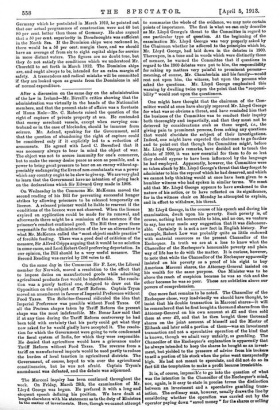On the same day in the Commons Sir F. Low,
the Liberal member for Norwich, moved a resolution to the effect that to impose duties on manufactured goods while admitting agricultural products free would be indefensible. The resolu- tion was a purely tactical one, designed to draw out the Opposition on the subject of Tariff Reform. Captain Tryon moved an amendment in favour of Imperial Preference without Food Taxes. The Solicitor-General ridiculed the idea that Imperial Preference was possible without Food Taxes. Of all the Protean shapes taken by Tariff Reform the present shape was the most indefensible. Mr. Bonar Law said that if at any time during the Tariff Reform controversy he had been told with certainty that his party could get what they now asked for he would gladly have accepted it. The resolu- tion for which the Government were going to vote condemned the fiscal system of India, for which they were responsible. He denied that agriculture would have a grievance under Tariff Reform without Food Taxes. The revenue from a tariff on manufactured imports would be used partly to reduce the burden of local taxation in agricultural districts. The Government, of course, hoped to win over the agricultural constituencies, but he was not afraid. Captain Tryon's amendment was defeated, and the debate was adjourned.














































 Previous page
Previous page